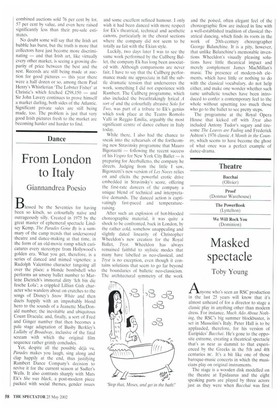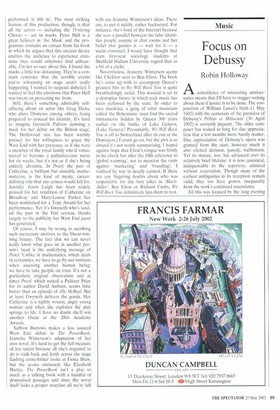Masked spectacle
Toby Young
Anyone who's seen an RSC production in the last 25 years will know that it's almost unheard of for a director to stage a classic play in anything other than modern dress. For instance, Much Ado About Nothing. the RSC's big summer blockbuster, is set in Mussolini's Italy. Peter Hall is to be applauded, therefore, for his version of Euripides' Bacchai. He's gone to the opposite extreme, creating a theatrical spectacle that's as near as dammit to that experienced by the Greeks in the 5th and 4th centuries BC. It's a bit like one of those baroque-music concerts in which the musicians play on original instruments.
The stage is a wooden disk modelled on the theatre at Epidaurus and the eight speaking parts are played by three actors just as they were when Bacchai was first
performed in 406 BC. The most striking feature of this production, though, is that all the actors — including the 15-strong Chorus — are in masks. Peter Hall is a great believer in the Mask' and the programme contains an extract from his book in which he argues that this ancient device enables the audience to experience emotions they would otherwise find unbearable. I'm not so sure about this. I found the masks a little too distancing. They're a constant reminder that the terrible events you're witnessing on stage aren't really happening. I wanted to suspend disbelief; I wanted to feel the emotions that Peter Hall was intent on protecting me from.
Still, there's something admirably selfeffacing about an actor like Greg Hicks, who plays Dionysus among others, being prepared to conceal his identity. It's hard to imagine Gwyneth Paltrow donning a mask for her debut on the British stage. The Hollywood star has been warmly praised for her willingness to grace the West End with her presence, as if she were a member of the royal family who'd volunteered to become a palliative-care nurse for six weeks, but it's not as if she's being entirely altruistic. In Proof the part of Catherine, a brilliant but unstable mathematician, is the kind of meaty, careerdefining role that any actress would kill for. Jennifer Jason Leigh has been widely praised for her rendition of Catherine on Broadway and Mary-Louise Parker has been nominated for a Tony Award for her performance. Yet it's Gwyneth who's landed the part in the film version, thanks largely to the publicity her West End jaunt has generated.
Of course, I may be wrong in ascribing such mercenary motives to the Oscar-winning beauty. The fact that we can never really know what goes on in another person's head is the underlying message of Proof. Unlike in mathematics, which deals in certainties, we have to go by our instincts when assessing another human being; we have to take people on trust. It's not a particularly original observation and at times Proof which netted a Pulitzer Prize for its author David Auburn, seems little better than an episode of Ally McBeal. But at least Gwyneth delivers the goods. Her Catherine is a tightly wound, angry young woman and when she explodes the play springs to life. I have no doubt she'll win another Oscar at the 2004 Academy Awards.
Saffron Burrows makes a less assured West End debut in The PowerBook, Jeanette Vv'interson's adaptation of her own novel. It's hard to get the full measure of her talent because all she's required to do is stalk back and forth across the stage flashing come-hither looks at Fiona Shaw, but she seems ominously like Elizabeth Hurley. The PowerBook isn't a play so much as a talking book with a handful of dramatised passages and since the novel itself lacks a proper storyline all we're left with are Jeanette Winterson's ideas. These are, to put it mildly, rather hackneyed. For instance, she's fond of the Internet because she sees a parallel between the false identities people assume in chat rooms and her belief that gender is — wait for it — social construct. I would have thought that even first-year sociology students at Sheffield Hallam University regard that as a bit of a cliché.
Nevertheless, Jeanette Winterson seems like Chekhov next to Ben Elton. The book he's come up with to accompany Queen's greatest hits in We Will Rock You is quite breathtakingly awful. This musical is set in a dystopian future in which rock music has been outlawed by the state. In order to save mankind, a gang of rebel musicians called 'the Bohemians' must find the sacred instruments hidden by Queen 300 years earlier on the banks of Lake Geneva. (Lake Geneva? Presumably, We Will Rock You is off to Switzerland after its run at the Dominion.) I could go on, but the plot is so absurd it's not worth summarising. I hoped against hope that Elton's tongue was firmly in his cheek but after the fifth reference to 'global warming', not to mention the rants against 'marketing' and 'branding', I realised he was in deadly earnest. If there are any lingering doubts about who was responsible for the best jokes in 'BlackAdder', Ben Elton or Richard Curtis, We Will Rock You definitively lays them to rest.























































































 Previous page
Previous page